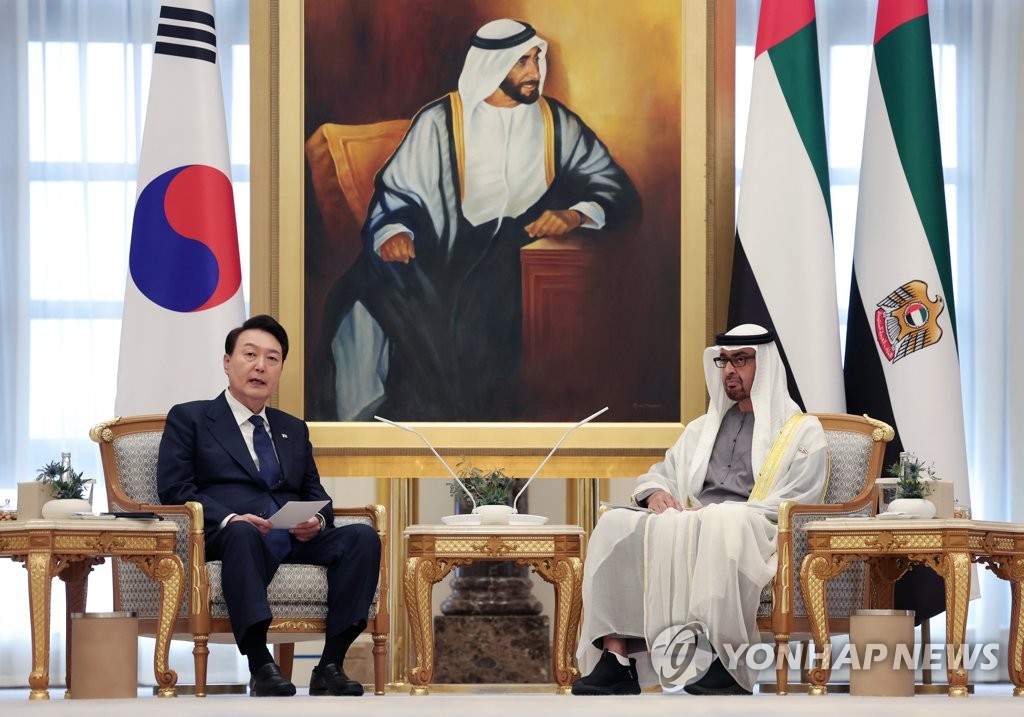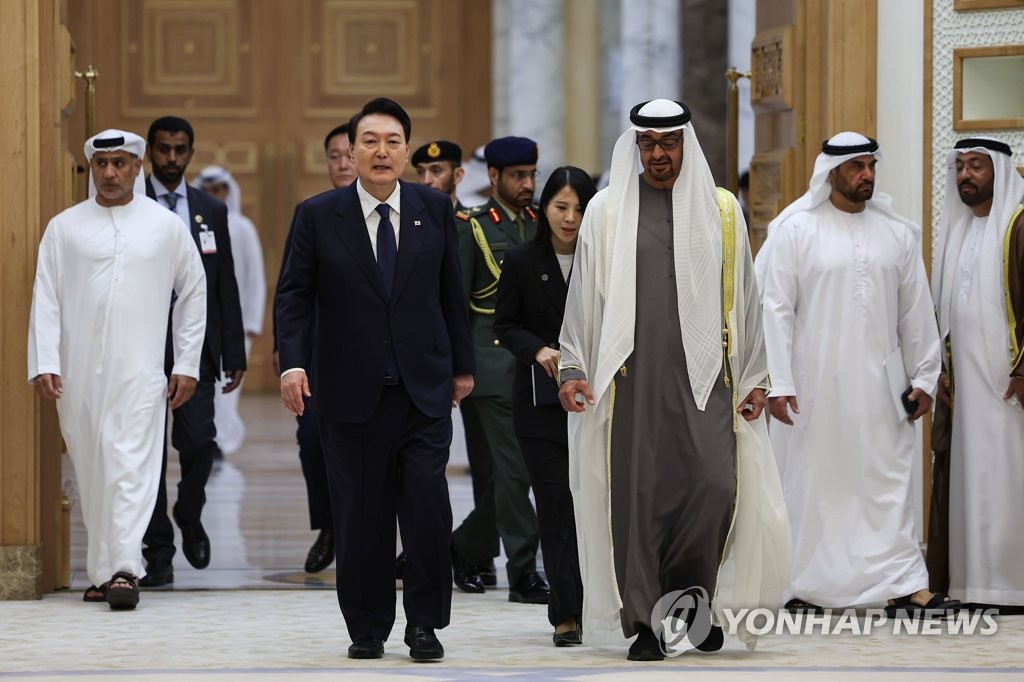The Rise of South Korea in the Middle East and North Africa

Photo: Tổng thống Hàn Quốc Yoon Suk Yeol (left) meeting with Tổng thống UAE Mohamed bin Zayed Al Nahyan in Abu Dhabi on January 15, 2023. (Source: Yonhap)
In recent years, Asian powerhouses have shown increasing interest in the Middle East and North Africa (MENA), strengthening their economic, political, and security relationships with countries in the region. While China has received much attention for its growing role in this vibrant activity, it is important to highlight that South Korea is not the only Asian power seeking presence in the MENA region. Specifically, South Korea has demonstrated continuous commitment to increasing its influence, particularly in the Gulf region.
According to Sara Coppolecchia, an expert at the Italy-based International Analysis and Research Institute (IARI), South Korea has actively built relationships with MENA countries, promoting diplomatic ties and expanding cooperation in various fields. These relationships have become increasingly interdependent in recent years, partly due to Seoul’s growing economic strength and the efforts of Middle Eastern countries to diversify their economies and rebuild after conflicts.
The relationship between South Korea and the Middle East is primarily driven by economic interests, closely tied to Seoul’s energy needs as well as investment and business opportunities in a rapidly developing region. There are also geopolitical benefits, as Seoul aims to establish itself as a reliable partner in the region and be recognized as an Asian powerhouse alongside China and India.
Oil and Gas
As mentioned, South Korea’s cooperation with Middle Eastern countries is diverse but primarily focuses on energy security.
It is worth noting that Seoul relies almost entirely on imports for its fossil fuel needs, with imports accounting for 98% of its total consumption. In 2021, South Korea became the world’s fourth-largest importer of crude oil, with crude oil imports valued at $60.6 billion. That year, crude oil became South Korea’s largest imported product for the first time. Seoul mainly imports crude oil from Saudi Arabia, the United States, Kuwait, Russia, and Iraq.
In 2021, South Korea also imported $24.5 billion worth of natural gas, making it the world’s sixth-largest importer of natural gas. Natural gas is the third-largest imported product for South Korea. The main gas suppliers are the United States, Qatar, Australia, Oman, and Malaysia. These figures, provided by the Observatory of Economic Complexity (OEC), highlight South Korea’s significant dependence on Middle Eastern countries to meet its energy needs.
Until 2019, South Korea was also a major importer of oil from Iran. However, economic sanctions severely hindered Seoul’s relationship with Tehran, initially paralyzing Iran’s economy and restricting South Korea’s trade with Iran. As a result, South Korea turned to other countries for oil supply.
Among these countries, Saudi Arabia plays a crucial role, as Seoul signed 51 agreements and memoranda of understanding in October last year. These include a deal between the state-owned Korea National Oil Corporation and Saudi Aramco, the giant oil company of Saudi Arabia. The agreement stipulates the establishment of a joint crude oil reserve storage facility of approximately 5.3 million barrels, to be located in Ulsan, South Korea, by 2028.
Nuclear Energy
In the past decade, South Korea has expanded its energy cooperation with the Middle East, including renewable energy. In particular, Seoul has increasingly supported several countries in the region in diversifying their energy mix, addressing the desires of oil-rich autocratic regimes to reduce their dependence on fossil fuels and diversify their economies.
South Korea officially expressed its desire to become a nuclear technology exporter when the Ministry of Trade, Industry, and Energy announced plans to export 80 nuclear reactors by 2030.
Since then, South Korea has started exporting its reactors, with a particular focus on the United Arab Emirates (UAE). Currently, 4 reactors are in operation at the Barakah nuclear power plant, built through the collaboration of South Korea and the UAE.

Photo: Tổng thống Hàn Quốc Yoon Suk Yeol (left) accompanying Tổng thống UAE Mohamed bin Zayed Al Nahyan (right) to the summit venue at the Qasr Al Watan presidential palace in Abu Dhabi on January 15, 2023. (Source: Yonhap)
Security and Arms Trade
Historically, South Korea’s involvement in defense and security issues in the MENA region has been limited compared to other major powers. However, in recent years, the country has significantly increased its presence in this field.
South Korea has participated in US-led alliances, including conflicts and wars related to Iraq. Additionally, South Korea has contributed through United Nations peacekeeping missions, such as the United Nations Interim Force in Lebanon (UNIFIL). Furthermore, South Korea has a naval presence in countering piracy in the Gulf of Aden and the Strait of Hormuz.
However, Seoul’s most significant contribution in terms of defense and security for countries in the region comes from arms sales. South Korea is currently the world’s fifth-largest military power according to the Global Firepower Index 2024, and it emerged as a major arms exporter in 2022, with key markets in the Middle East, Southeast Asia, and South America.
One of the earliest agreements in the MENA region took place in 2013 with Iraq, which purchased T-50IQ training aircraft from the Korea Aerospace Industries (KAI).
Since then, South Korea has signed major arms and equipment export contracts with Egypt, the UAE, and Saudi Arabia. South Korea’s arms deals have undoubtedly benefited from the increasing needs and desires of MENA countries to develop their industrial and national defense capabilities.
In summary, with the increasing shift of global economic and political power towards Asia, countries in the Middle East and North Africa are paying more attention to the East, seeking to strengthen their relations with key Asian powers such as China, Japan, South Korea, and India.
Cooperating with these powers, along with the growing importance of Asia globally, is driven by a strategy of diversifying diplomatic and economic relationships. This strategy aims to minimize the political risks associated with dependence on a single major partner. This approach has become increasingly important for countries in the MENA region, driven by uncertainties related to US behavior and, for some, the desire to break free from historical dependence on colonial powers.
In this context, South Korea is emerging as a capable partner, reinforcing its presence in the region and expanding relationships across various countries and sectors. These relationships continue to develop and hold significant prospects for further growth, as they meet the diverse needs of countries in the region.
